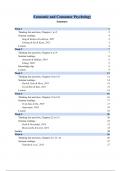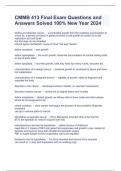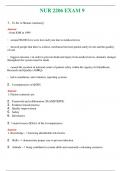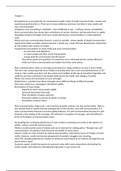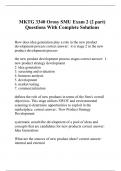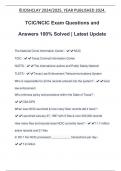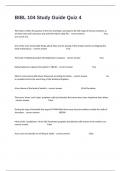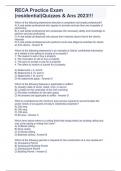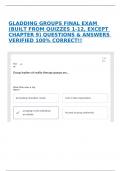Summary
Week 1 2
Thinking fast and slow, Chapters 1 u/i 5 2
Seminar readings 4
Yang & Roskos-Ewoldseen, 2007 4
Cheung & Sia & Kuan, 2012 4
Lecture 4
Week 2 7
Thinking fast and slow, Chapters 6 u/i 9 7
Seminar readings 8
Antonetti & Maklan, 2014 8
Chang, 2020 9
Knowledge clip 9
Lecture 9
Week 3 12
Thinking fast and slow, Chapters 10 u/i 18 12
Seminar readings 14
Paek & Yoon & Hove, 2011 14
Cui & Kim & Kim, 2021 14
Lecture 14
Week 4 16
Thinking fast and slow, Chapters 19 u/i 24 16
Seminar readings 17
Vo & Xiao & Ho, 2019 17
Aqueveque, 2018 18
Lecture 18
Week 5 20
Thinking fast and slow, Chapters 25 u/i 31 20
Seminar readings 23
Nash & Rosenthal, 2014 23
Branscombe & Lister, 2014 23
Lecture 24
Week 6 26
Thinking fast and slow, Chapters 32, 33, 34 26
Seminar readings 27
Tiefenbeck et al., 2013 27
, Cho & Schwarz, 2008 27
Guan et al., 2023 27
Lecture 28
Week 7 29
Thinking fast and slow, Chapters 35 u/i 38 29
Seminar readings 30
Loveland et al., 2010 30
Carter & Gilovich, 2012 31
Lecture 31
Week 8 34
Seminar readings 34
Kervyn et al., 2022 34
Connors et al., 2021 35
Grau & Zotos, 2016 35
Lecture 35
General recap System I & System II 38
1
, Week 1
Cognitive Ease and Effort
Thinking fast and slow, Chapters 1 u/i 5
Psychologists have been interested for decades in two different models of thinking; namely
system 1 and system 2. To put simply, this is the differences between them;
System I operates automatically and quickly, with little effort or voluntary control. This
system might be activated when looking at someone’s face or reading a book.
System II uses attention and mental effort to think about various problems or
computations. It is associated with voluntary control and concentration, and might be
activated when thinking of an answer in an exam.
System I is capable of generating surprisingly difficult patterns of thoughts, however,
only system II can put order in these cognitions. In other words, system I continuously creates
ideas, intentions, or feelings that system 2 can turn into actions. System II is therefore called
upon when system I does not have the automatic answer to something. This happens when we
see the calculation 45 x 293, but not when we see 2 x 2.
Our capacity to pay attention is limited; as such, our social behavior behaves accordingly.
We know that we cannot hold two conversations at once, or that we should not be on our phones
while driving. The division of work between the two systems is very efficient, as it optimizes
performance.
However, conflict can also arise between the two systems. This is when cognitive
illusions may arise. This happens when system I makes an assumption that system II has to go
against consciously. It is hard to overcome this; constantly having system II on the lookout for
mistakes that system I might make would be too effortful. System II can sometimes become a
little lazy, and simply “accept” the answers given by System I. As such, people who are often
impatient and follow their intuitions are also those more likely to get questions that include
cognitive illusions wrong.
2
, You can see whether someone is engaged in an effortful task by looking at their pupils;
these dilate when concentrated. Pupils are thus an indicator of a person’s mental energy. When
a task is so difficult that it goes beyond the person’s capacity, the pupils stop dilating. This is a
sign that the person has fallen back in the usage of heuristics.
System II actually has a natural rhythm at which it generates ideas and thoughts, even
when these are not consciously asked of. This means that cognitive work does not always
necessit actual willpower. Besides this, self-control is also a form of mental work. This is why
people are more likely to succumb to a temptation when exerting mental effort, or why people’s
social skills get worse after a long at work. This phenomenon is also called ego depletion, and is
partly due to a loss of motivation. Some research has shown that this ego depletion can be
countered by administering glucose, although this has not been completely confirmed yet.
Priming is the idea that exposure to one stimulus will influence your reaction to another
stimulus. In other words, you have a vast network of ideas in your brain that constantly activate
each other. Stimuli do not only influence our thoughts, but can also unconsciously influence our
emotions and actions. This can have real life effects; it has for instance been shown that voters
are more likely to support propositions for financial education when the voting stations are in a
school. These priming phenomena all arise in system I.
Cognitive ease can be seen as the relatively low mental effort and direction of attention
you have to partake in. Cognitive strain, on the other hand, is rather the opposite. When you are
experiencing cognitive ease, various effects can take place; you are more likely to trust your
intuitions and to be in a good mood. Moreover, you will experience more cognitive ease when
something is familiar to you. This sense of familiarity is created by system I, before being passed
on to system II to make sense of it. People are thus more likely to believe something is true if it’s
familiar to them, but also when their cognitive strain is reduced. This can be done by making a
message more legible, memorable, or easier to pronounce. Consequently, a lower cognitive strain
causes a more pleasurable experience for most people. An example of this relating to the sense of
familiarity, is the mere exposure effect; people enjoy something more when they have been
exposed to it often.
Quality of pastness, a concept related to cognitive ease, refers to the feeling that
something is familiar because it seems to be a reflection of prior experience. In other words,
when we encounter something that feels familiar, we often associate it with the sense of having
encountered it in the past. However, this quality of pastness might be an illusion. It explains that
when we see words or stimuli that we have encountered before, they appear more familiar
because they are processed with greater cognitive ease. In other words, our brains recognize
these familiar items more quickly and easily than unfamiliar ones. This increased ease of
processing gives us the impression that we have encountered these items in the past, even if we
haven't.
3

